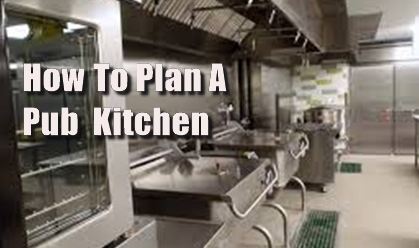This guest article considers all the vital elements you need to get right when designing an efficient and safe commercial kitchen.
If your pub is in a position to expand its services to include food, you’re in a very fortunate position. Serving food in pubs is a great way to increase revenue and attract new customers. Before you take the leap, you need the right space to prepare food, and all the right equipment and facilities to allow you to do so. With the help of catering equipment specialists Nisbets, we’ve compiled a list of things you need to include to make the most of your space, maintain workflow and safety regulations.
Make sure you include and consider the following:
Preparation stations
Place your prep station between the cooking areas and food storage, so the food preparation sits in a logical position in the workflow – and include sinks and hand wash basins if you have room. You will need a separate area in which to prepare raw meat, to avoid cross-contamination with other ingredients. Many commercial kitchens use colour-coded chopping boards to avoid this. Choose stainless steel for the surfaces so they wipe down easily during and after service.
Fridges, freezers and dry storage
You’ll need somewhere to store prepped food and ingredients before they are prepped for service. Think about how much chilled and dry storage you need based on frequency of service, delivery times and how quickly you expect to use your produce.
For fridges, you can choose counter refrigeration for your prep station. Upright cabinet fridges are also available as an option and can be bought in light or heavy duty models. Alternatively, for high volumes of fresh food, consider a cold room.
For freezers, you can choose counter and under-counter freezers to save space, or chest freezers for a larger storage space. With larger freezers, they can double up as a prep surface if you choose one with a stainless steel top – saving you even more space.
Ovens, fryers and microwave
The first decision to make when it comes to your oven is do you need gas or electric. Gas ovens are more suited to heavy-duty, busier kitchens and are more responsive to temperature change. Electric is a great substitute if you have a smaller kitchen or don’t have a gas supply.
Fryers are an essential tool in cooking, helping you prepare food quickly – think chips, onion rings, fried chicken and other delicious treats. Choose from a free-standing fryer or a counter-top fryer, depending on your space requirements.
Microwaves come in all shapes and standards, but make sure you get a commercial microwave to get the power you need to cope with a commercial kitchen.
Extraction units
With the cooking taking place in your kitchen, you’ll need adequate extraction to ensure the environment is clear and clean – and that you comply with the regulations expected of you. Get an interlocking system with a gas cut-off in case the ventilation hood fails to ensure you’re adhering to your legal requirements.
Dishwashers
One of the most essential items if you’re thinking about fitting a commercial kitchen is a dishwasher! You can choose from under-counter washers if you need to save some space, pass through dishwashers or conveyors for very high volume loads. Choose wisely: this will be your biggest time-saver in the kitchen!
For more information on kitting-out your commercial kitchen, you can read the original article here.
